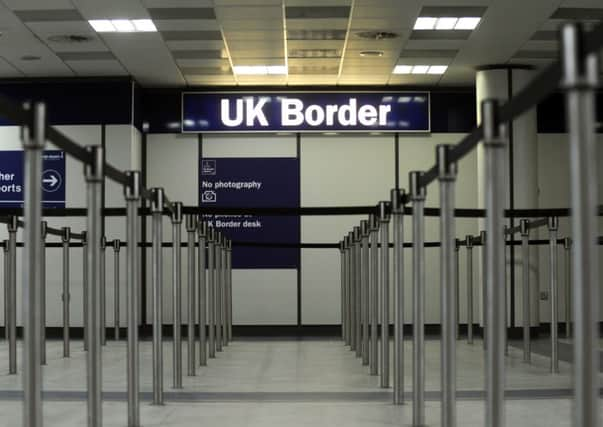Michael Fry: Open door immigration pragmatism


Old, unhappy societies tend to lose emigrants; young, optimistic societies tend to receive immigrants and indeed welcome them. At least this is a generalisation that holds true for much of human history.
The most salient example at the present day is the difference between the United States and the European countries from which most Americans’ ancestors came.
Advertisement
Hide AdAdvertisement
Hide AdEven now, the great republic across the Atlantic Ocean remains the sweet land of liberty, the prime destination for the world’s migrants, though in the 21st century, the huddled masses yearning to breathe free usually arrive from Latin America and Asia.
In that sense, the US, while its 200th birthday lies some way behind it, remains in spirit a young, optimistic society, and nobody who goes there can doubt it.
Europe, by contrast, seems to have passed from old age to decrepitude, though thatdoes not stop some of its nations exhibiting a renewed lust for life since theyliberated themselves from Communism.
Is it going too far to say that the same sort of difference exists, or is coming into existence, between England and Scotland?
England is an old society, a pretty tired one, still finding it hard to redefine its post-imperial role in the world and certainly not happy with its experience of immigration. Grimy suburbs of Manchester or Birmingham or, above all, London strike some native English people as scarcely belonging to their country, rather as extensions of Pakistan or Jamaica.
In turn, the experience of the immigrants is often no happier, given the poverty and prejudice that are their frequent lot.
Here is the formula for the ghetto, first its disenchantment and then its violence.
In Scotland, we do not have ghettos. While it would be going too far to say we do not have racial prejudice, it does not act on our society so as to generate a geographical concentration of misery and resentment or the extreme human reactions against it.
Advertisement
Hide AdAdvertisement
Hide AdThe obvious reason is we do not have all that many immigrants, and those we do have are not obviously made unwelcome. Their integration may fall short of entirety, but it is extensive. So the problems are subdued and controlled. Would this change if we had more immigrants?
The question arises because the First Minister says he would be happy to see more immigrants. That marks him out starkly from politicians at Westminster, many falling over each other to demonstrate their anti-immigrant toughness.
Not that it seems to have had much practical effect so far.
The latest figures show a surge in the number of Romanians and Bulgarians arriving in Britain.
It is a trifle rash, perhaps, of them to do so just in advance of a general election. We can expect the political hysteria over their coming to continue.
In these circumstances, what is in it for Alex Salmond to take the stance he takes?
Ukip’s success in seizing a seat at the European election shows not all Scots share his liberal view. That may make the more extravagant claims for some deeper difference between the Scottish and English populations, the one more internationalist, the othermore xenophobic, ring a little hollow.
So if Salmond were merely posturing, there would be downside risks for him, and at a moment not the best to add to them.
In fact, there are perfectly good, objective, economic reasons why Scotland might wish to welcome more immigrants.
Advertisement
Hide AdAdvertisement
Hide AdFor most of the past century, we have had an underperforming economy, feeble in comparison with economies of similar size in Europe, feeble even by theless demanding standards of the UK.
We might more recently have moved up the regional league table, but mainly because English regions outside the south-east have been in quite rapid relative decline.
In other words, Scotland does not grow fast enough, neither by international comparison nor to fulfil the aspirations of its own people.
From London, which has no such problem, it is all too easy to see this as the plaint of a backward region needing subsidies to keep it going (though insufficiently grateful for them).
It may on the other hand prove the whole concept of regional aid to be unsound. Whatever may make an economy flourish, it is not this.
Economic theory tells us we need three things to achieve growth.
We need capital to invest – and that should not in Scotland be a huge problem, especially if we make better use of oil revenues.
We need technological advance – and we have excellent universities spearheading research as well as a tradition of successful entrepreneurs.
Advertisement
Hide AdAdvertisement
Hide AdAnd we need an increased supply of labour, because expanding industries will employ more workers.
How are we going to find them from an ageing population? One answer, though not the sole answer, is immigration.
Amid Britain’s present pitched battle of postures on immigration, there may in Scotland be a deeper change going on: a change from failed policies of the 20th century towards a choice of policies that will work better in the 21st century, not least because inspired by the criteria of capitalism rather than by clapped-out collectivism. And they could work better both under independence and under devo-max.
In either case, it would have turned out that immigration is good for this rejuvenated society.